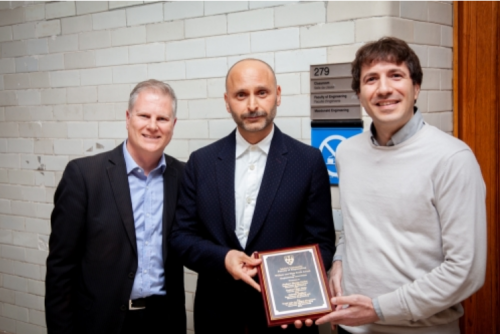Winners of the 2017-2018 William and Rhea Seath Awards Competition

Professor Brett Meyer and Professor Warren Gross (both Electrical and Computer Engineering) for “Effortless AI Makes Artificial Intelligence Easy”.
Executive summary:
While AI is clearly the future, most developers lack the expertise to build such systems. Effortless AI, by automating the design and optimization of machine learning systems, makes it possible to bring efficient AI to more devices, faster. Though we are not the first or only to automate the design of machine learning algorithms (e.g., Google’s AutoML, NYTimes) we are unique in our approach: by explicitly considering issues that matter for mobile/IoT systems (e.g., the time or energy required to perform facial recognition), we produce the best systems possible for these platforms. The WRSA will offer critical support at a key time as we work to prepare our prototype for customer validation and early contracts, and ultimately to raise seed funding.

Professor Showan Nazhat (Materials Engineering) and his team comprised of Professor Anie Philip (Surgery, not present) and PhD student Gabriele Griffanti (Materials Engineering) for “Rapid high through-put 3D-printed in vitro skin models for drug discovery and screening”
Executive summary:
This proposal aims to advance a world unique 3D printing technology developed at McGill University that is based on a recently granted U.S patent (9,764,060). Our breakthrough development is the 3D bioprinting of tissue structures with varying architectures based on a platform bioink system with a novel printing method. By using naturally derived bioink hydrogels with incorporated cells, the printed tissue structures can be tailored to mimic collagen fibril density and alignment, as well as cell loading and density according to the intended use. This novel approach will overcome current challenges in the bioprinting of tissues such as maintaining cell viability and spatial control in 3D microenvironments during processing. In this WRSA proposal, we intend to reduce to practice this technology by focusing on the 3D bioprinting of in vitro skin models to investigate a novel therapeutic in the treatment of fibrosis and cancer.
